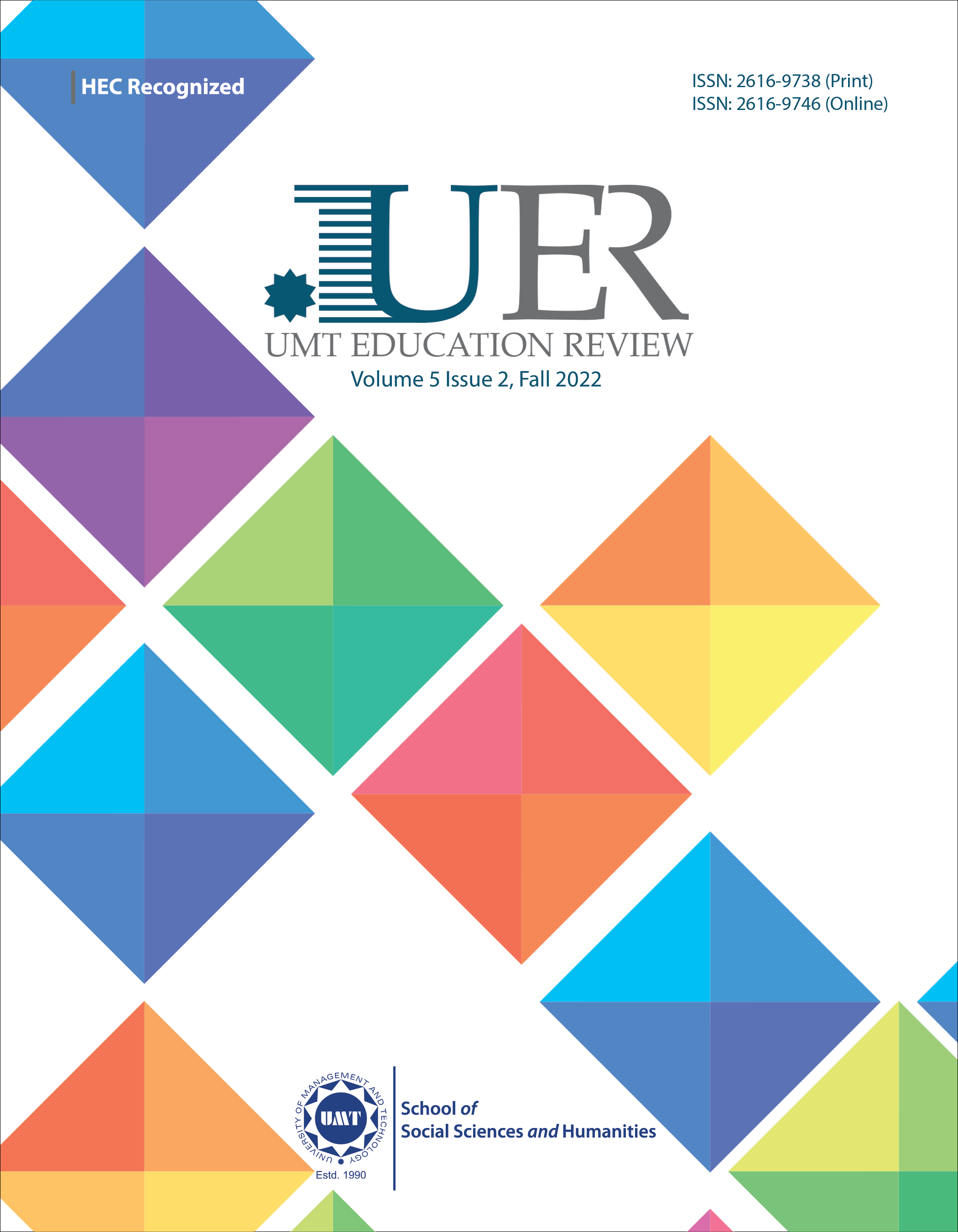Translation, Adaptation, and Cross Language Validation of the Revised Version of Developmental Coordination Disorder Questionnaire’07 (DCDQ’07) in Urdu Language (DCDQ-UR)
Abstract
 Abstract Views: 145
Abstract Views: 145
The current study analyses children with Developmental Coordination Disorder (DCD) who face difficulty in learning through physical activities. Such children find it more difficult while performing movement skills, learning new physical tasks, and applying self-help skills in their day to day life. These functional limitations at times lead towards the range of other psychological and emotional problems. The application of valid and reliable screening and diagnostic tool is a prerequisite to start appropriate rehabilitation services. The current study aims to translate and validate DCDQ’07 into Urdu language for Pakistani population in order to identify children with DCD. This step is especially taken because there is no screening tool available in Urdu language. So far children with DCD have severely been understudied in Pakistan. The current study was divided into two phases, preliminary and main studies. The preliminary phase revealed the process of translation and cross language validation of the scale. The main study was conducted on a sample of 70 children at risk of DCD to establish psychometric properties of DCDQ-UR. Results demonstrated the adequate test-retest reliability, significant inter-item correlation, item total correlation and item loading scores. The DCDQ-UR has proved to be a valid and reliable scale for screening of children with DCD in the age ranging from 5 to 15 years among Pakistani population.
Downloads
References
Biotteau, M., Danna, J., Baudou, É., Puyjarinet, F., Velay, J. L., Albaret, J. M., & Chaix, Y. (2019). Developmental coordination disorder and dysgraphia: Signs and symptoms, diagnosis, and rehabilitation. Neuropsychiatric Disease and Treatment, 15, (1), 1873-1875. https://doi.org/10.2147/NDT.S120514
Blank, R., Barnett, A. L., Cairney, J., Green, D., Kirby, A., Polatajko, H., Rosenblum, S., Smits-Engelsman, D., Sugden, D., Wilson, P., & Vinçon, S. (2019). International clinical practice recommendations on the definition, diagnosis, assessment, intervention, and psychosocial aspects of developmental coordination disorder. Developmental Medicine & Child Neurology, 61(3), 242-285. https://doi.org/10.1111/dmcn.14132
Blank, R., Smits‐Engelsman, B., Polatajko, H., & Wilson, P. (2012). European academy for childhood disability (EACD): Recommendations on the definition, diagnosis and intervention of developmental coordination disorder (long version). Developmental Medicine and Child Neurology, 54(1), 54-93. https://doi.org/10.1111/j.1469-8749.2011.04171.x
Caçola, P. (2014). Movement difficulties affect children’s learning: an overview of developmental coordination disorder (DCD). Learning Disabilities: A Multidisciplinary Journal, 20(2), 98-106.
Caravale, B., Baldi, S., Gasparini, C., & Wilson, B. N. (2014). Cross-cultural adaptation, reliability and predictive validity of the Italian version of Developmental Coordination Disorder Questionnaire (DCDQ). European Journal of Paediatric Neurology, 18(3), 267-272. https://doi.org/10.1016/j.ejpn.2013.11.009
Dewey, D., & Bernier, F. P. (2016). The concept of atypical brain development in developmental coordination disorder (DCD)—a new look. Current Developmental Disorders Reports, 3(2), 161-169. https://doi.org/10.1007/s40474-016-0086-6
Hill, E. L., & Brown, D. (2013). Mood impairments in adults previously diagnosed with developmental coordination disorder. Journal of Mental Health, 22(4), 334-340. https://doi.org/10.3109/09638237.2012.745187
Kirby, A., Williams, N., Thomas, M., & Hill, E. L. (2013). Self-reported mood, general health, wellbeing and employment status in adults with suspected DCD. Research in Developmental Disabilities, 34(4), 1357-1364. https://doi.org/10.1016/j.ridd.2013.01.003
Magalhães, L. D. C., Cardoso, A. A., &Missiuna, C. (2011). Activities and participation in children with developmental coordination disorder: A systematic review. Research in Developmental Disabilities, 32(4), 1309-1316. https://doi.org/10.1016/j.ridd.2011.01.029
Missiuna, C., Moll, S., King, S., King, G., & Law, M. (2007). A trajectory of troubles: parents' impressions of the impact of developmental coordination disorder. Physical & Occupational Therapy in Pediatrics, 27(1), 81-101. https://doi.org/10.1080/J006v27n01_06
Ray-Kaeser, S., Thommen, E., Martini, R., Jover, M., Gurtner, B., & Bertrand, A. M. (2019). Psychometric assessment of the French European developmental coordination disorder questionnaire (DCDQ-FE). Plos One, 14(5), e0217280. https://doi.org/10.1371/journal.pone.0217280
Smits-Engelsman, B., Vincon, S., Blank, R., Quadrado, V. H., Polatajko, H., & Wilson, P. H. (2018). Evaluating the evidence for motor-based interventions in developmental coordination disorder: A systematic review and meta-analysis. Research in Developmental Disabilities, 74(1), 72-102. https://doi.org/10.1016/j.ridd.2018.01.002
Smits-Engelsman, B., & Verbecque, E. (2022). Pediatric care for children with developmental coordination disorder, can we do better? Biomedical Journal, 45(2), 250-264. https://doi.org/10.1016/j.bj.2021.08.008
Zoia, S., Barnett, A., Wilson, P., & Hill, E. L. (2006). Developmental coordination disorder: Current issues. Child: Care, Health and Development, 32(6), 613-618.
Zwicker, J. G., Missiuna, C., Harris, S. R., & Boyd, L. A. (2012). Developmental coordination disorder: a review and update. European Journal of Paediatric Neurology, 16(6), 573-581. https://doi.org/10.1016/j.ejpn.2012.05.005

This work is licensed under a Creative Commons Attribution 4.0 International License.
UER follows an open-access publishing policy and full text of all published articles is available free, immediately upon publication of an issue. The journal’s contents are published and distributed under the terms of the Creative Commons Attribution 4.0 International (CC-BY 4.0) license. Thus, the work submitted to the journal implies that it is original, unpublished work of the authors (neither published previously nor accepted/under consideration for publication elsewhere). On acceptance of a manuscript for publication, a corresponding author on the behalf of all co-authors of the manuscript will sign and submit a completed Copyright and Author Consent Form.
Copyright (c) The Authors










